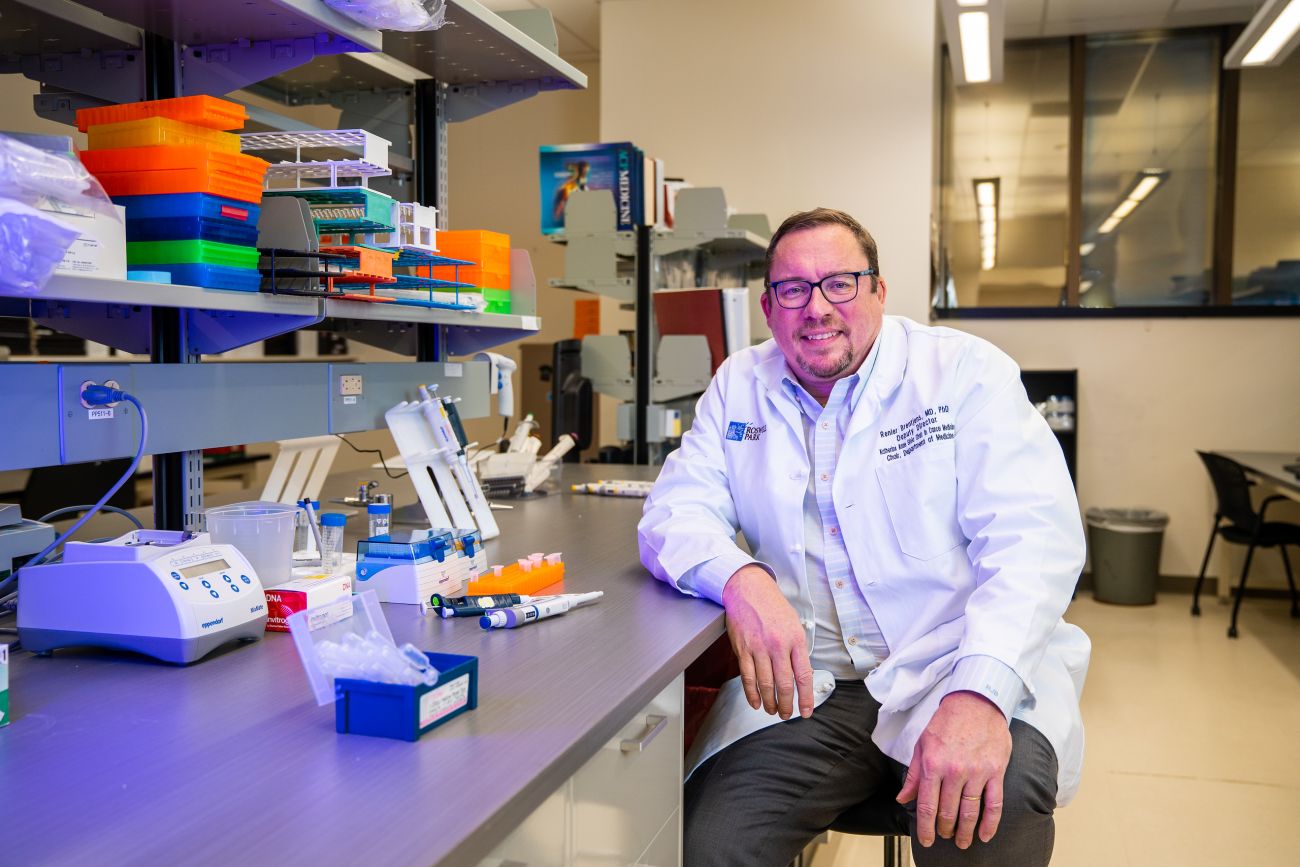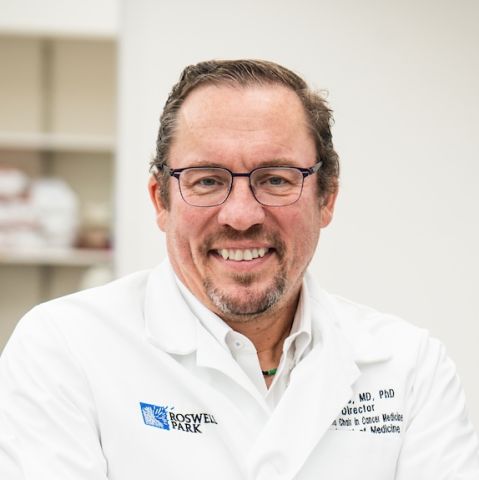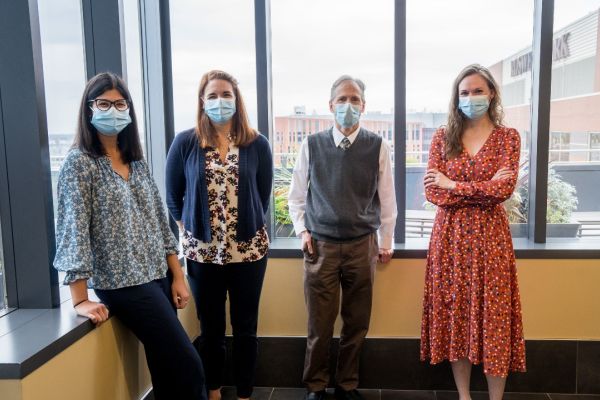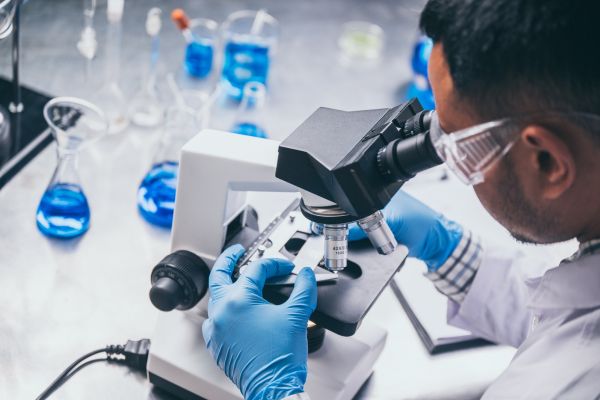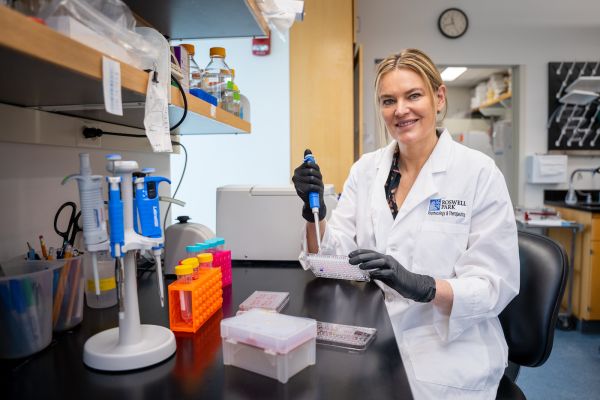It's the big dream of a cancer researcher to see their hypothesis proven true in a lab.
For Renier Brentjens, MD, PhD, Deputy Director and Chair of the Department of Medicine at Roswell Park Comprehensive Cancer Center, that moment came when he was still a research fellow and established the course of his entire career.
During a keynote address at a national meeting, he was introduced to the concept of gene therapy, the idea that human immune cells could be manipulated to help fight diseases, including cancer. When he started working at Memorial Sloan Kettering Cancer Center (MSKCC), he lobbied to join a lab working on what is now known as CAR T-cells. "They had viral vectors that would allow you to put gene therapy on immune cells. I had to contact that lab five or six times before I got in to talk with them. Then they showed me this concept of making an artificial receptor that could recognize proteins on the surface of cancer cells and, using those viral vectors, using gene therapy, those receptors could be expressed on the immune cells."
Immune cells sometimes get tricked into not seeing cancer cells for what they are, allowing them to continue growing and sometimes spreading throughout the body. By modifying the immune cells and making them smarter and able to see cancer cells and attack them, cancer patients who might otherwise have limited options for recurring or relapsing cancer could have new hope.
The opportunity of a lifetime
Of course, getting the concept to work outside the theoretical science was "more complicated than we thought at the time," Dr. Brentjens says. "But the biggest thing, when you research, is you have to have faith in what you are doing. It is the hardest when you don't think something will work. It's hard to come in on weekends and work late."
And sometimes life has other ideas about when big breaks will happen. Dr. Brentjens and his wife were slated to be on a trip to Ireland when the results of his first big trial of CAR T-cell therapy in preclinical models were set to finish. In the days before smartphones, he promised not to call to check in on the test before they returned home — but the moment he landed and saw a pay phone, he called his lab.
The technician calmly said the experiment was completed and that some of the models had a strong result but didn't specify whether it was in the control group or the one receiving the treatment. "I couldn't get anything out of her. We got home; I kissed my son and went straight to the lab. The results were unequivocal: The treated models were all healthy. You almost didn't have to call a statistician. The technician didn't realize she saw the experiment of a lifetime."
He recalls the moment with joy even 20 years later. "It was intoxicating on an intellectual level. I will never forget it. It took years before the FDA approved it, but it was one of those simple experiments with such an unequivocal outcome — those are the ones that help you get up early in the morning, help you stay at the lab late, and come in on weekends. Some brilliant scientists go an entire lifetime without this, and I was a fellow and got the experiment of a lifetime."
Dr. Brentjens remembers another time, a few years later, when he had a patient with terrible side effects from treatment, so weak and sick he needed to roll them on their side for some tests. This patient was one of his first patients to receive CAR T-cell therapy, and after the treatment, "we went back to the bone marrow lab to look at their test results with one of my colleagues. He and I spent 30 minutes looking at the bone marrow test sample and couldn't find a single tumor cell. We couldn't believe this was happening."
Never miss another Cancer Talk blog!
Sign up to receive our monthly Cancer Talk e-newsletter.
Sign up!Building on early successes
When he came to Roswell Park last year, Dr. Brentjens had a clear vision that could allow more researchers to share in those mind-blowing moments of genuinely moving the needle for cancer care.
Coming to a cancer institute where research is prioritized, and patients have access to clinical trials is critically important. With the world-class Shared Resources available at Roswell Park, and the ability to design and lead clinical trials and prioritize immunotherapy research, he intends to make this center a world leader in innovative gene therapy within the next five to 10 years.
With more than 20 years of experience and results developing CAR T-cell treatments for liquid tumors, Dr. Brentjens wants to dedicate the next chapter of his career to developing treatments for solid tumors that are just as effective and offer as much hope for those patients.
"Moving on intel in a clinical setting is critical," he says. "Roswell Park is a top-tier institution. I returned to Buffalo and was completely blown away by the institution and scientists. Candace (Johnson, Roswell Park's President, and CEO) and I got along from the get-go. We had a shared mentality, and by the time I left that first visit, I knew it would be hard for me to turn down. I was offered Chair of Medicine, which would allow me to have clinical control over the development of cell therapies. As Deputy Director, I would have control over the GMP facility. When I gave my talk to the other directors, I said, 'If you're going to bring me here, we're going to be a premier cell therapy institution.' I got no pushback."
He says that Roswell Park can do that because it invests in research and researchers and can quickly address a prioritized demand.
"If in five years we're not one of the top ten, and in 10 years, if we are not THE top cell therapy institution, that's on me," Dr. Brentjens says. "I'm at a stage in my career where I do not need to advertise myself. I want to build something. I would love to make an already top-tier cancer center be firmly and continuously in the top 10. One of the things we can do to improve it is to establish a reputation in one focused area, and I think we'll be able to do that. It's very exciting."
Why gene therapy matters
This should be exciting to patients as well. Gene therapy, and immunotherapy, present a brand-new frontier in cancer care, in which the body fights against cancer, meaning the side effects can be less without reducing the efficacy of treatment.
Chemotherapy is effective but does not discriminate in the cells it fights, Dr. Brentjens says. This is why chemotherapy patients can feel weak, sick, and lose their hair during treatment. "Now that we know so much more about tumors and the immune system, we can start utilizing our immune system in the context of gene therapy technology. That means the cell therapies we currently have are a proven principle. The work we're doing, what we realize now is that it's so conceptually different to target the cancer cells. It's a living drug."
It will take time to advance, but Roswell Park's ability to dedicate resources and research in this area will be a prominent draw for researchers and patients. This work and these treatments could revolutionize cancer treatment in the same way chemotherapy was viewed as a breakthrough more than 50 years ago.
Dr. Brentjens wants to thank, in advance, the patients and their families who will someday enroll in the clinical trials to help advance cancer treatment research. "We owe these patients, and the public, that we do our trials in a very thoughtful manner so that even if the patient enrolled in the trial doesn't clinically benefit, they'll know their trial led to the next step," he says. "I can't tell you how many patients over the years we've put in trials, even for CAR T-cells, and if it didn't work, they were consoled by the fact that their participation would benefit their children and grandchildren. There's significant altruism when talking about patients enrolling in our trials."
